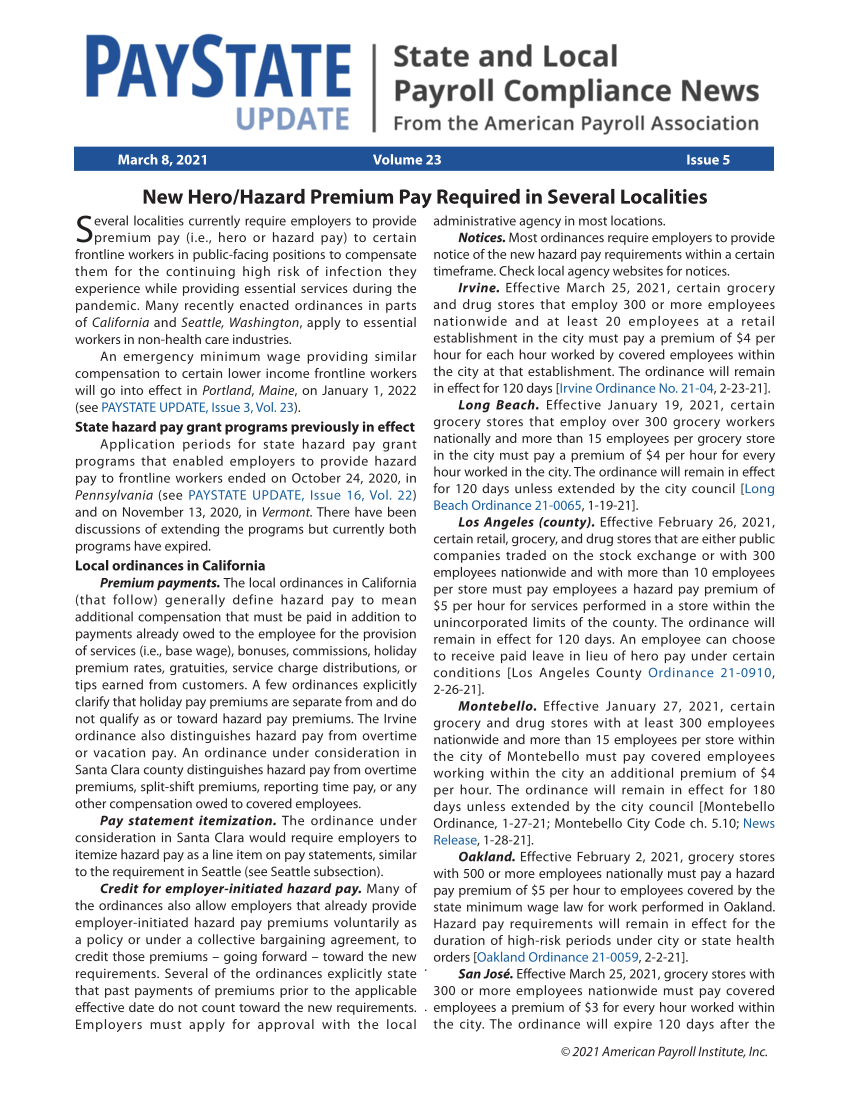© 2021 American Payroll Institute, Inc. New Hero/Hazard Premium Pay Required in Several Localities Spremium everal localities currently require employers to provide pay (i.e., hero or hazard pay) to certain frontline workers in public-facing positions to compensate them for the continuing high risk of infection they experience while providing essential services during the pandemic. Many recently enacted ordinances in parts of California and Seattle, Washington, apply to essential workers in non-health care industries. An emergency minimum wage providing similar compensation to certain lower income frontline workers will go into effect in Portland, Maine, on January 1, 2022 (see PAYSTATE UPDATE, Issue 3, Vol. 23). State hazard pay grant programs previously in effect Application periods for state hazard pay grant programs that enabled employers to provide hazard pay to frontline workers ended on October 24, 2020, in Pennsylvania (see PAYSTATE UPDATE, Issue 16, Vol. 22) and on November 13, 2020, in Vermont. There have been discussions of extending the programs but currently both programs have expired. Local ordinances in California Premium payments. The local ordinances in California (that follow) generally define hazard pay to mean additional compensation that must be paid in addition to payments already owed to the employee for the provision of services (i.e., base wage), bonuses, commissions, holiday premium rates, gratuities, service charge distributions, or tips earned from customers. A few ordinances explicitly clarify that holiday pay premiums are separate from and do not qualify as or toward hazard pay premiums. The Irvine ordinance also distinguishes hazard pay from overtime or vacation pay. An ordinance under consideration in Santa Clara county distinguishes hazard pay from overtime premiums, split-shift premiums, reporting time pay, or any other compensation owed to covered employees. Pay statement itemization. The ordinance under consideration in Santa Clara would require employers to itemize hazard pay as a line item on pay statements, similar to the requirement in Seattle (see Seattle subsection). Credit for employer-initiated hazard pay. Many of the ordinances also allow employers that already provide employer-initiated hazard pay premiums voluntarily as a policy or under a collective bargaining agreement, to credit those premiums – going forward – toward the new requirements. Several of the ordinances explicitly state that past payments of premiums prior to the applicable effective date do not count toward the new requirements. Employers must apply for approval with the local administrative agency in most locations. Notices. Most ordinances require employers to provide notice of the new hazard pay requirements within a certain timeframe. Check local agency websites for notices. Irvine. Effective March 25, 2021, certain grocery and drug stores that employ 300 or more employees nationwide and at least 20 employees at a retail establishment in the city must pay a premium of $4 per hour for each hour worked by covered employees within the city at that establishment. The ordinance will remain in effect for 120 days [Irvine Ordinance No. 21-04, 2-23-21]. Long Beach. Effective January 19, 2021, certain grocery stores that employ over 300 grocery workers nationally and more than 15 employees per grocery store in the city must pay a premium of $4 per hour for every hour worked in the city. The ordinance will remain in effect for 120 days unless extended by the city council [Long Beach Ordinance 21-0065, 1-19-21]. Los Angeles (county). Effective February 26, 2021, certain retail, grocery, and drug stores that are either public companies traded on the stock exchange or with 300 employees nationwide and with more than 10 employees per store must pay employees a hazard pay premium of $5 per hour for services performed in a store within the unincorporated limits of the county. The ordinance will remain in effect for 120 days. An employee can choose to receive paid leave in lieu of hero pay under certain conditions [Los Angeles County Ordinance 21-0910, 2-26-21]. Montebello. Effective January 27, 2021, certain grocery and drug stores with at least 300 employees nationwide and more than 15 employees per store within the city of Montebello must pay covered employees working within the city an additional premium of $4 per hour. The ordinance will remain in effect for 180 days unless extended by the city council [Montebello Ordinance, 1-27-21 Montebello City Code ch. 5.10 News Release, 1-28-21]. Oakland. Effective February 2, 2021, grocery stores with 500 or more employees nationally must pay a hazard pay premium of $5 per hour to employees covered by the state minimum wage law for work performed in Oakland. Hazard pay requirements will remain in effect for the duration of high-risk periods under city or state health orders [Oakland Ordinance 21-0059, 2-2-21]. San José. Effective March 25, 2021, grocery stores with 300 or more employees nationwide must pay covered employees a premium of $3 for every hour worked within the city. The ordinance will expire 120 days after the March 8, 2021 Volume 23 Issue 5
Printed for: PayrollOrg Bookshelf © 2024 American Payroll Institute, Inc. All Rights reserved. From: PayrollOrg Digital Publications (bookshelf.payroll.org)







